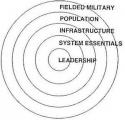I agree with Slap, I think you misunderstood. No one is saying dump a ton of foreign cash into the local economy. The idea is to use foreign currency where there is no established government (hence no local currency) and we are installing a caretaker protectorate until such time as a new government can be formed.
Step one, security. Step two, economy. Once the economy is established and we have some idea of what the country can actually sustain for a government, then, together with the locals, we build THAT level of government rather than try to install a democracy, the Cadillac (or Mercedes or Jaguar) of governments from the start.
At least I think that was where we were going













Bookmarks